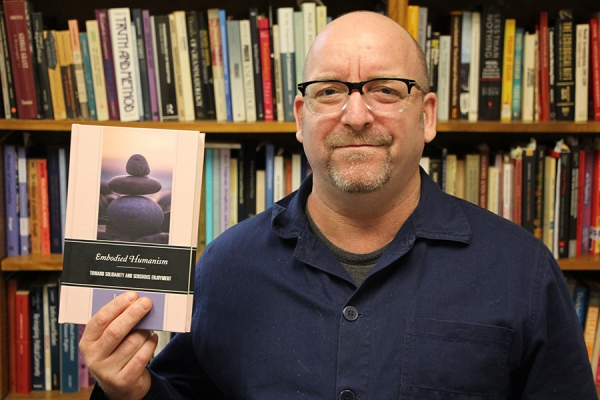 Philosophy professor Jeff Noonan says his new book is the conclusion of an arc of thought that started with his PhD dissertation.
Philosophy professor Jeff Noonan says his new book is the conclusion of an arc of thought that started with his PhD dissertation.
When he completed work on his new book, philosophy professor Jeff Noonan found it was the conclusion of a line of inquiry he had been following since his doctoral studies, 25 years ago.
“As a philosopher, one of the key questions we grapple with is why is life worth living,” Dr. Noonan says. “My first published work was Critical Humanism and the Politics of Difference, which began as my dissertation. I have continued exploring this subject, but with 25 years of thinking and reading built in.”
In Embodied Humanism: Toward solidarity and sensuous enjoyment, he explores the notion that sensuous enjoyment is key to a worthwhile life, tracing the development of humanist thought from the ancient world to contemporary political struggles.
“We have to satisfy our needs for resources: food, clothing, shelter; and find a way to gain satisfaction from making a contribution in whatever form,” Dr. Noonan says. “Once we have a society that allows us to meet those preconditions, our life is ours to enjoy.”
He notes that time stands still when we enjoy food or drink, share a laugh with friends, or appreciate the beauty of nature or human creations.
“In some ways, that delight is the crowning achievement of human experience,” he says.
Noonan says Embodied Humanism is aimed at anyone who is interested in the problems of the goods of human life: “I try to keep the jargon to a minimum in a way that’s accessible to people who are willing to put in a bit of effort.”
A gathering Thursday, Oct. 27, will serve to launch the book. It begins at 6:30 p.m. on the second floor of the Sandwich Brewing Company, 3232 Sandwich St. Attendees will have a chance to buy a copy at a discount, but Noonan says the launch is not really about selling books.
“I’m there to get together with friends and colleagues and celebrate the publication of the work,” he says. “I’ll say a few words, but not long enough to bore people.”
He will further discuss his thought Nov. 24 in a presentation for the Humanities Research Group entitled “Eating, Working, Laughing: Embodied Humanist Values for the Twenty-First Century.”
